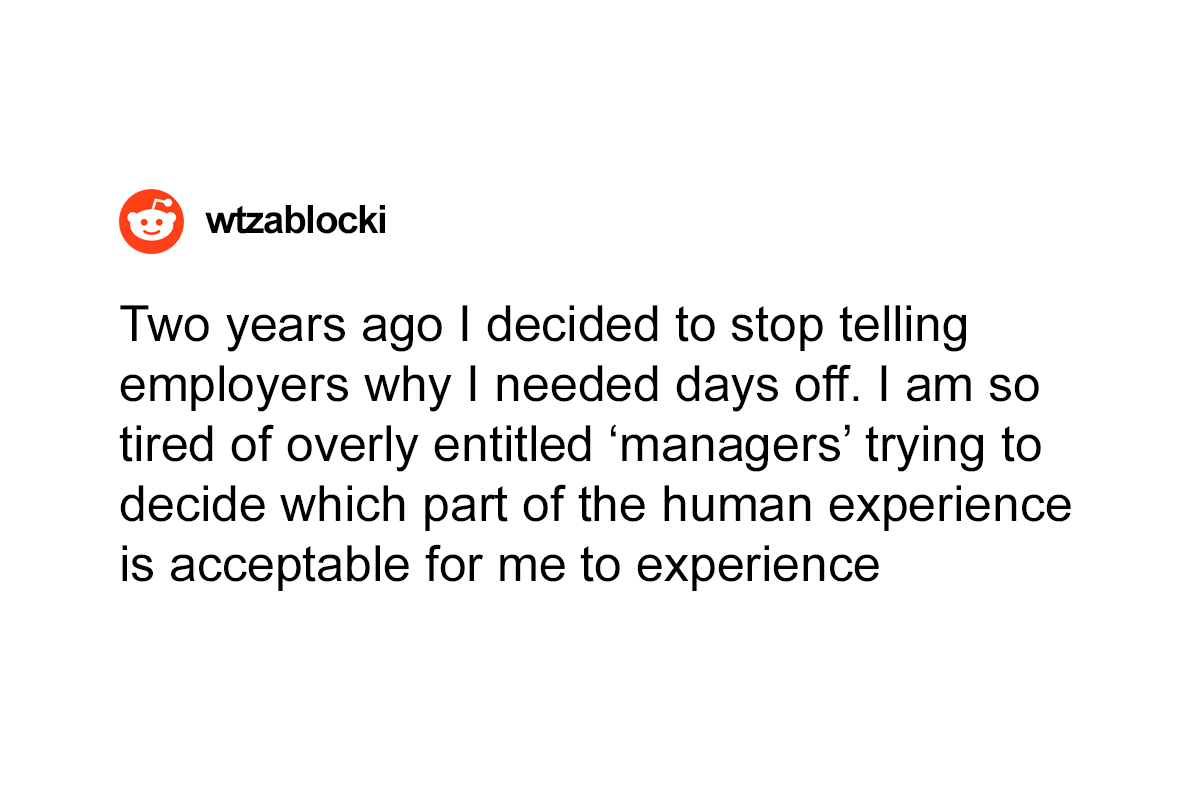
Person Explains Why He Stopped Telling Bosses Why He Needs A Day Off And Why There’s Nothing They Can Do About It
By focusing on the things that we control, we can make adjustments that greatly benefit our mental well-being.
Reddit user Wtzablocki submitted a story to the platform’s ‘Antiwork’ community, detailing how they improved their work life. And the beautiful aspect of it is that the change didn’t require all that much effort.
All that Wtzablocki did was they stopped explaining themselves to their employer whenever they wanted time off.
It sounds simple, but the dignity that comes from understanding that you are the boss of you can tremendously impact your sense of worth.
This person was sick and tired of work creeping into their private life and vice versa
Image credits: Monstera (not the actual photo)
So they made one simple adjustment, and it helped tremendously
Image credits: RODNAE Productions (not the actual photo)
To learn more about our desire to be in control of our life, we contacted social science writer and researcher Jeremy Sherman, Ph.D., MPP.
“A sense of control is important but perhaps not as important as having a sense of what we do and don’t control,” Sherman, the author of Neither Ghost nor Machine: The Emergence and Nature of Selves, told Bored Panda. “A sense of control is double-edged. We want control but we dread responsibility if we fail, like if we chose our life’s path and it turned out terrible. I call that the ‘free willies.'”
“People think they want free will, not determinism. What they really want is a ratchet, freedom to rise, and determinism to keep them from falling.”
You could even make the case that we humans tend to voluntarily abandon the driver’s seat. “It turns out that throughout evolutionary history, we’ve been giving up control when it’s advantageous to us. I call it lazy gene theory,” Sherman said.
“For example, humans are addicted to external vitamin C, when hardly any other mammals are. (You don’t have to give your cat oranges.) About 35 million years ago, we got up in trees where there was abundant fruit. We no longer had to make our own vitamin C. We lost the ability and now we’re addicted to external vitamin C. It’s the genetic equivalent of no longer having to remember phone numbers or read maps because we’re addicted to our phones.”
“These days, people feel way more independent than in the old days, but in fact, we’re way more dependent, just on really reliable infrastructure,” Sherman said. For more information on the topic, check out this short but comprehensive video by the researcher.
If you feel like you need to regain power over yourself, Sherman suggests “doing a Marie Kondo on your addictions.”
“Keep the addictions you want and not the addictions you don’t. For example, I love most of my addictions. I work to keep them going and they feed me. In the old days, my addictions would often clash. For example, I really wanted to write and speak honestly and I really wanted a relationship. I wanted a relationship with a hot subordinate partner, and I really wanted an equal.”
“I’m 66 now. About 8 years ago, I realized I no longer wanted a partner. I wanted my mind back from the tension inherent in a relationship, the way that to feel safe in intimacy, you want total honesty and total affirmation which, after the honeymoon period, are often at odds.”
“I somehow gave up my addiction to having a partner,” Sherman said. “I regained control over what I could think and write. I ‘got my mind back,’ maybe in part by admitting to myself that I was too mouthy for a partner to feel safe with me. I joke that I’m glad my lack of appetite finally caught up with my lack of aptitude.”
Interestingly, Sherman believes love and addiction are virtually the same thing, just with different prognoses. “With both, you’re doing dedicated work to maintain something you depend upon (e.g. paying for your cell phone so you don’t have to remember numbers or read maps, getting Vitamin C from an outside source, or keeping your partner happy),” he explained.
“The difference between love and addiction is whether you think it’ll turn out well. For example, if you think your buddy’s relationship is bad for them, you’d say ‘dude, you’re addicted’ and if you think it will turn out well, you’d say ‘you’re in love.'”
So if you want to regain control, shed an addiction. “I have a rule: ‘I can’t change myself but I can often change my environment so it changes me,'” Sherman said.
And when you think about it, this is exactly what Wtzablocki did.
As the story went viral, it also prompted a discussion on work-life balance
This is such a bizarre concept to me. I have 30 days paid days off and never ever have I been asked as to why I need the time off, other then a casual "doing anything fun?" question, let alone been required to deliver an explanation. Quite the reverse even as managers sometimes have to remind people to take their time off before the year ends. Sure, sometimes we have to rearrange our holidays, because not all colleagues can be off at the same time, but other than that it is fine. But then I live in "socialist / communist" Europe with at least 20 paid days off required by law, lol :)
I am a manager of a group of highly skilled senior engineers within a large company in Australia. We have a number of guidelines we follow, but as managers we can also use our own discretion to make decisions. (before we take the role of managers we take mandatory mindfulness training) One of the most important company wide mandates is to ensure that each and everyone that works in our firm has a healthy Work/Life balance. That means that if a person asks for time off, as managers, we actively support it without asking any questions. We also discourage anybody working after 5:30pm as we consider that as family time, unless that work cannot be done over normal time, in which case we would let the employee who worked out of hours take the next day off (or any other day of their choosing) as time in lieu. I treat the people that I manage that work WITH me (not for me) as adults, because they ARE adults and hence we find that people are FAR more happy and productive at work.
When I was a manager, I never questioned why any of my directs wanted some time off. Sometimes they would tell me, and sometimes they wouldn't. I would often ask them, "Doing anything fun?" but that was it. And if they didn't want to venture any information, that was totally acceptable as well. My job as their manager was to make sure they didn't get disturbed during their time off.
This is such a bizarre concept to me. I have 30 days paid days off and never ever have I been asked as to why I need the time off, other then a casual "doing anything fun?" question, let alone been required to deliver an explanation. Quite the reverse even as managers sometimes have to remind people to take their time off before the year ends. Sure, sometimes we have to rearrange our holidays, because not all colleagues can be off at the same time, but other than that it is fine. But then I live in "socialist / communist" Europe with at least 20 paid days off required by law, lol :)
I am a manager of a group of highly skilled senior engineers within a large company in Australia. We have a number of guidelines we follow, but as managers we can also use our own discretion to make decisions. (before we take the role of managers we take mandatory mindfulness training) One of the most important company wide mandates is to ensure that each and everyone that works in our firm has a healthy Work/Life balance. That means that if a person asks for time off, as managers, we actively support it without asking any questions. We also discourage anybody working after 5:30pm as we consider that as family time, unless that work cannot be done over normal time, in which case we would let the employee who worked out of hours take the next day off (or any other day of their choosing) as time in lieu. I treat the people that I manage that work WITH me (not for me) as adults, because they ARE adults and hence we find that people are FAR more happy and productive at work.
When I was a manager, I never questioned why any of my directs wanted some time off. Sometimes they would tell me, and sometimes they wouldn't. I would often ask them, "Doing anything fun?" but that was it. And if they didn't want to venture any information, that was totally acceptable as well. My job as their manager was to make sure they didn't get disturbed during their time off.

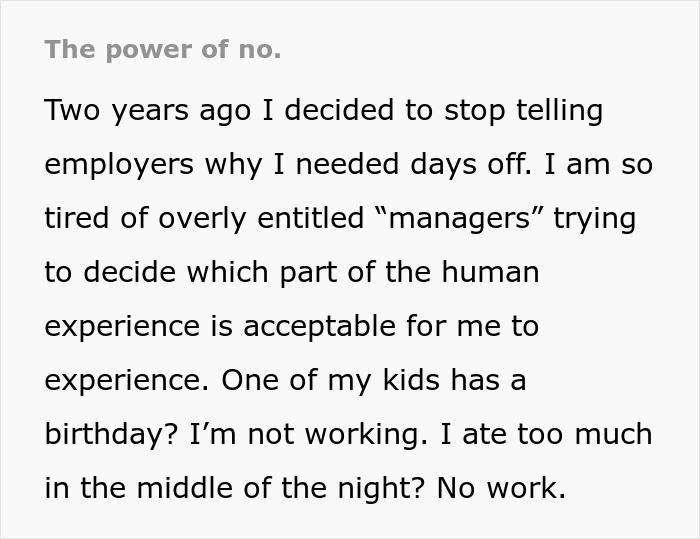
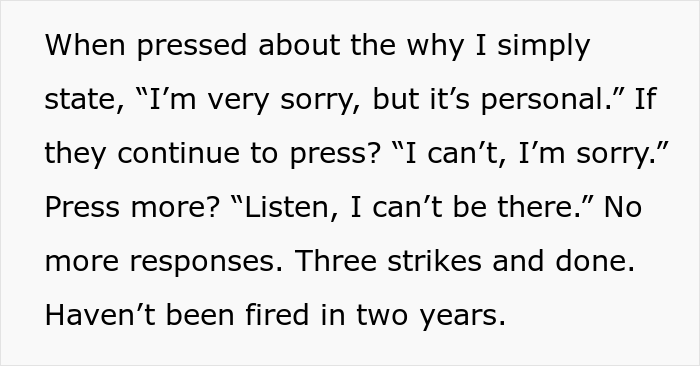

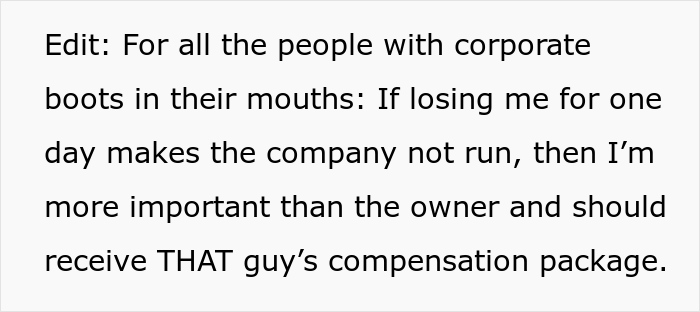
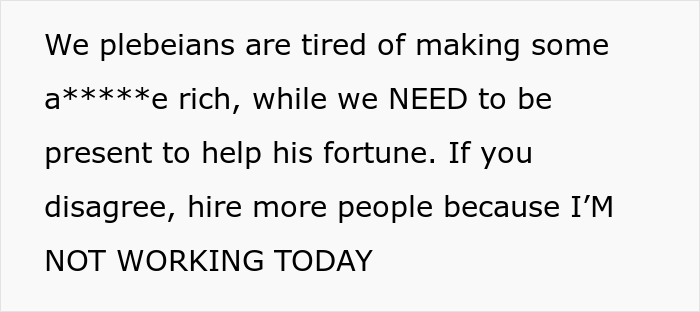



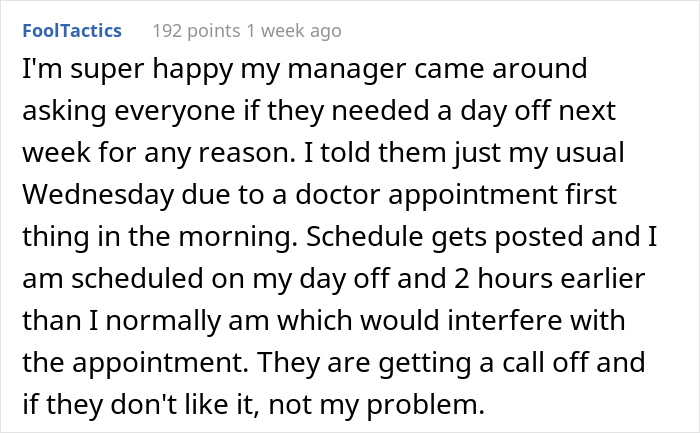
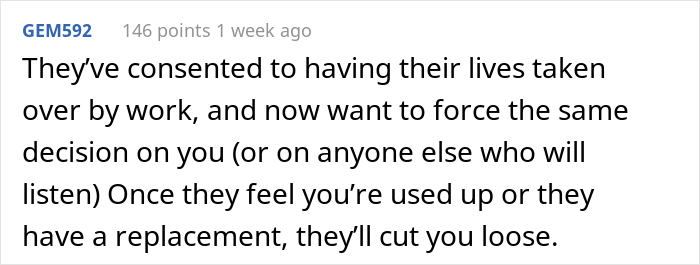

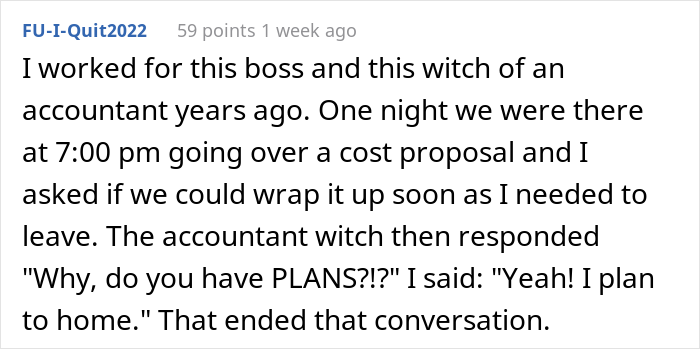

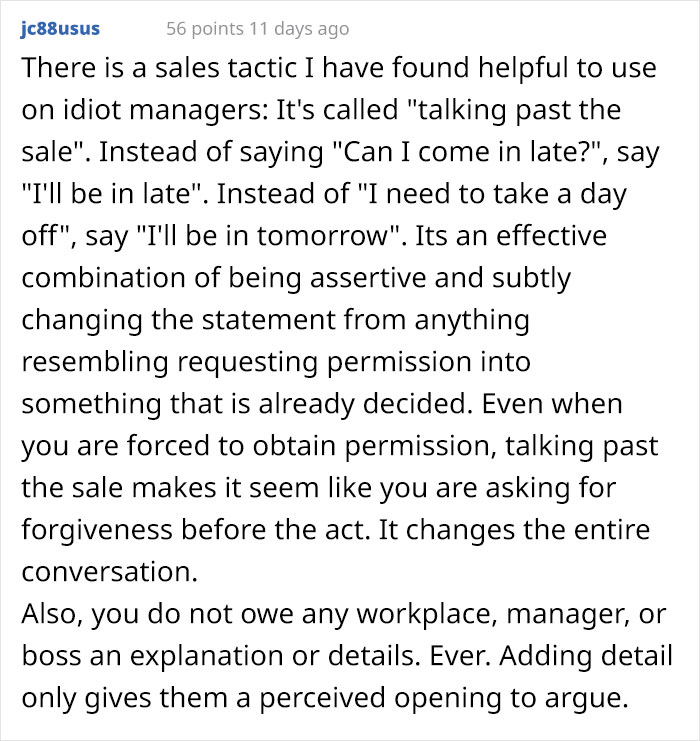

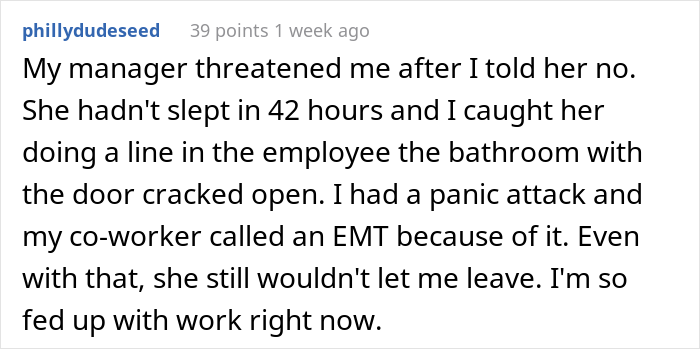
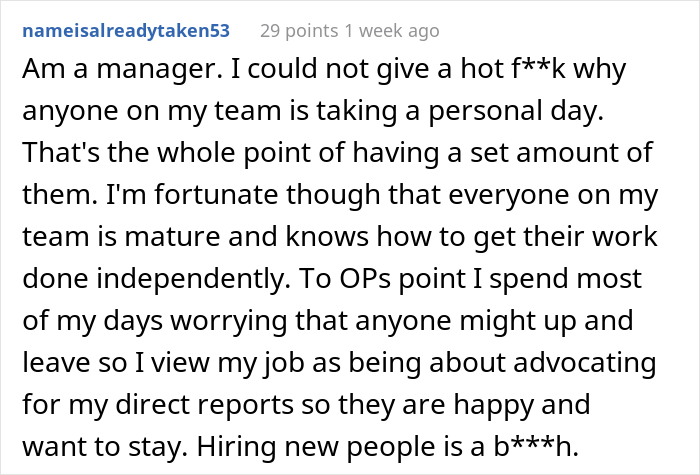


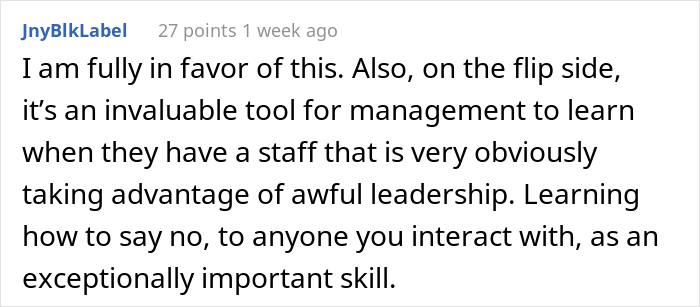




126
28